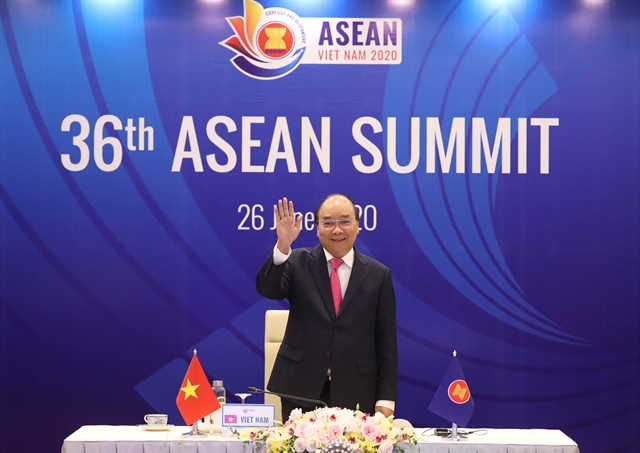 Politics & Law
Politics & Law


|
| Việt Nam's Prime Minister Nguyễn Xuân Phúc at the summit. — VNA/VNS Photo Thống Nhất |
HÀ NỘI — Plans to facilitate intra-regional trade to boost pandemic-hit economies and tensions over the resource-rich South China Sea were spotlighted at the ASEAN Summit on Friday.
During the summit that was held virtually for the first time in the regional bloc's 53-year history due to the coronavirus pandemic, ASEAN leaders reiterated the need to enhance the region’s resilience and solidarity to overcome adversity.
In his opening speech, Vietnamese Prime Minister Nguyễn Xuân Phúc said ASEAN is facing great difficulties and opportunities brought by the “tectonic shifts” in geopolitics and the pandemic, while multilateral institutions and international law is gravely challenged.
In this context, the Vietnamese Government leader stressed the increasingly important role and missions of global powers, multilateral and regional organisations, asking for a greater sense of responsibility towards the international community.
ASEAN leaders reviewed progress in the implementation of the ASEAN Community since last year, talked plans for the rest of the year, priorities for ASEAN diplomatic affairs and discussed regional and global affairs.
Deputy Prime Minister and Minister of Foreign Affairs of Việt Nam Phạm Bình Minh and ASEAN Secretary-General Lim Jock Hoi reported on ASEAN's response to the coronavirus pandemic, and ASEAN co-operation during the first six months of 2020 in the bloc's three pillars of political-security, economic and socio-cultural.
Appreciating the leadership of Việt Nam, ASEAN leaders agreed with the positive assessment of initial results of the region in combating COVID-19, with initiatives such as the ASEAN COVID-19 response fund, the ASEAN medical supplies reserve, ASEAN standard procedures for epidemic response and a comprehensive plan for post-pandemic economic recovery, saying ASEAN had conveyed a strong message of a cohesive and responsive organisation that holds the central role in regional processes.
ASEAN leaders have stressed the need to restore socio-economic activities and international trade in tandem with keeping the pandemic in check.
Concluding negotiations for and signing the Regional Comprehensive Economic Partnership deal this year would showcase ASEAN’s strong support for multilateral trade, economic liberalisation and free trade, which are key to regional post-pandemic revitalisation.
Some leaders proposed measures aimed at easing restrictions to ensure flow of goods and the supply chain in the region is not disrupted.
Malaysian Prime Minister Tan Sri Muhyiddin Yassin urged efforts to come up with plans to quickly implement "travel bubbles” between ASEAN states that have the coronavirus situation under control.
"Possibly in the near future, we can also open up our borders for intra-ASEAN tourism to flourish and deliver the much-needed financial boost to our national economies," the Malaysia PM said, sharing the view of the Sultan of Brunei Sultan Hassanal Bolkiah and Indonesia's President Joko Widodo.
For economic recovery, digital transformation and enhancing the workforce’s capacity and skills would be very important, the participants agreed.
At the summit, PM Phúc said that while ASEAN concentrates on managing the pandemic and has enjoyed initial success, there is a need to also complete priority areas in the building of ASEAN Community and deepen its foreign relations.
With both Indonesia and Việt Nam non-permanent members of the United Nations Security Council, ASEAN will have a chance to make helpful contributions to global affairs.
South China Sea
With nations stretched thin in dealing with the pandemic, there have been worrying reports over risks to stability and security in the South China Sea, one of the world’s busiest maritime routes, and ASEAN leaders have taken notice.
The Vietnamese PM condemned “acts of violating international laws, causing instability, complicating the situation and undermining trusts,” and asked for all countries to be more responsible.
During the summit, Southeast Asian leaders maintained ASEAN’s stance in upholding, peace, security, freedom of navigation and flight and maritime safety, stressing rule-based order and calling for trust-building based on peaceful measures in compliance with the Declaration of the Code of Conduct in the South China Sea (DOC) and international laws, especially the United Nations Convention on the Law of the Sea (UNCLOS 1982).
The pandemic has stalled the progress of negotiations for the Code of Conduct in the South China Sea between China and ASEAN, which was hoped to be concluded in 2021, and ASEAN has said the process should soon be resumed in a bid for regional peace and stability.
ASEAN leaders also discussed the refugee crisis in Rakhine State in Myanmar, stressing that ASEAN would need to provide more support to the country in helping the Rohingya population stabilise their life and tackle the consequences of the pandemic.
Concluding the summit, ASEAN leaders adopted the ASEAN Leaders' Vision Statement on a Cohesive and Responsive ASEAN: Rising above Challenges and Sustaining Growth and the ASEAN Declaration on Human Resource Development for Changing the World of Work.— VNS




